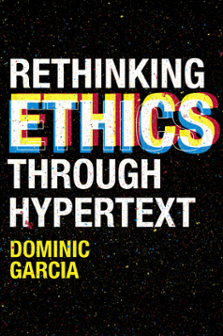
Prelims
Rethinking Ethics Through Hypertext
ISBN: 978-1-83867-426-7, eISBN: 978-1-83867-425-0
Publication date: 18 November 2019
Citation
Garcia, D. (2019), "Prelims", Rethinking Ethics Through Hypertext, Emerald Publishing Limited, Leeds, pp. i-xi. https://doi.org/10.1108/978-1-83867-425-020191009
Publisher
:Emerald Publishing Limited
Copyright © 2020 Dominic Garcia
Half Title Page
Rethinking Ethics Through Hypertext
Title Page
Rethinking Ethics Through Hypertext
By
DOMINIC GARCIA

United Kingdom – North America – Japan – India – Malaysia – China
Copyright Page
Emerald Publishing Limited
Howard House, Wagon Lane, Bingley BD16 1WA, UK
First edition 2020
© 2020 Dominic Garcia
Published under exclusive licence by Emerald Publishing Limited
Reprints and permissions service
Contact: permissions@emeraldinsight.com
No part of this book may be reproduced, stored in a retrieval system, transmitted in any form or by any means electronic, mechanical, photocopying, recording or otherwise without either the prior written permission of the publisher or a licence permitting restricted copying issued in the UK by The Copyright Licensing Agency and in the USA by The Copyright Clearance Center. Any opinions expressed in the chapters are those of the authors. Whilst Emerald makes every effort to ensure the quality and accuracy of its content, Emerald makes no representation implied or otherwise, as to the chapters' suitability and application and disclaims any warranties, express or implied, to their use.
British Library Cataloguing in Publication Data
A catalogue record for this book is available from the British Library
ISBN: 978-1-83867-426-7 (Print)
ISBN: 978-1-83867-425-0 (Online)
ISBN: 978-1-83867-427-4 (Epub)


Dedication
For the love of Justice
Preface
Among many other uses, the text has always been one of the major media for communicating desires and interests and in judging whether moral acts are ‘right’ or ‘wrong’. This, however, requires an interpretation of the text and a better understanding of the concept of hermeneutics. Discourse ethics, as a meta-text, has provided the means by which one could come to judge whether particularistic desires and interests are morally ‘right’ or ‘wrong’. This mode of communication has always been carried out through the physicality of unilinear writing.
This study explores the shortcomings of such mode of unilinearity and its effect on discourse ethics in particular. This will in turn bring to question judgements that are interpreted and recorded as acceptable or unacceptable by society at large. In due course, the physicality of the text will be challenged and will have a resonating effect on the discipline of hermeneutics as traditionally conceived and understood. Ultimately this study will push the reader to conclude that the unilinear mode of writing may not be effective enough for an exhaustive expressability.
Hypertext writing, or what is here called the Multiplicity of Discursive Paths, is introduced as an alternative to this long-standing tradition of unilinearity. This Multiplicity of Discursive Paths is intended to give the individual a better emancipatory expressability – uncastigated by the chronology of a rigid method of expression – so much needed in a post-truth culture. It is argued that such mode of expression will give discourse ethics, as a process of determining ‘right’ from ‘wrong’ moral actions, a better exhaustive expressability. This will result in contributing to a profounder way of perceiving justice and a broader way of understanding hermeneutics in the future. It shall be argued that pedagogical practices in hypertext writing may be beneficial for those institutions where the issuance of justice is so important and necessary.
Acknowledgements
This work could not have been possible without the exceptional qualities of a person who offered the academic expertise, encouragement and resilience for this work to be written. This is only a modest description of who my tutor and friend, David Rose, was for me throughout the positive experience at Newcastle University. I can say that Dr Rose made this experience a happy one thanks to his high level of professionality and the fact that he is a person of great character. If this book offers a contribution to philosophy, it is in no small part due to Dr Rose's assistance. I continue to think of David as the person who instilled in me the proper passion for research. A big thank you to David Rose.
Also a big thank you to my dear cousin Amanda Garzia, MA, who was so patient and kind and offered her time to proofread my work and discuss certain points with me. Without her help, this work would surely be of an inferior standard.
A heartfelt thank you.
- Prelims
- Introduction Setting up the Scene: On the Way to Hypertext
- Chapter 1 The Classical Handling of Ethics: Towards an Emancipative Path
- Chapter 2 Techniques for a Possible Handling of Ethics in a Post-truth Culture
- Chapter 3 Transformations of Ethics in Hypertextual Surroundings
- Chapter 4 Living the Post-truth Culture: Baking the Pre-truth Era through Hypertext
- Conclusion Negating a Conclusion: A Brief Introduction
- References
- Index